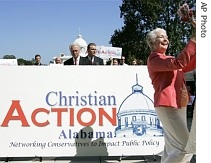2006年VOA标准英语-Liberals Compete with Conservatives for Religio(在线收听)
By Jim Malone
Washington
31 October 2006
Republicans are depending on a strong voter turnout among conservative Christians on November 7 as one way to limit expected Democratic gains in the midterm congressional elections. But some liberal groups also hope to use religious appeals to mobilize voters on Election Day.
----
 Jane Russell unveils a sign changing the name of The Christian Coalition of Alabama to it's new name, Christian Action Alabama |
||
In recent years, conservative Christian activists have focused their attention on opposing abortion and same-sex marriage as part of what they have long called a moral values agenda.
"We see America on this collision course between religious freedoms and the homosexual agenda. At their core, these are spiritual battles that we are engaged in and we need America's spiritual leaders to be at the forefront of this fight," said Tony Perkins, president of the Family Research Council, a leading conservative Christian advocacy group.
Democrats have had limited success in appealing to religious voters. In the 2004 election, for example, President Bush's strong showing among voters who regularly attend church was a factor in his narrow win over Democrat John Kerry.
But now some liberal groups are crafting what they believe will be an appealing message for religious voters that could have an impact on this year's congressional elections.
The Reverend Jim Wallis is editor of Sojourners magazine and one of the founders of a group that seeks to promote liberal Christian values.
"Moral values now apply to poverty, the environment, Darfur, HIV/Aids and the war in Iraq,” said Mr. Wallis. “The path of partisan use of religion is too well worn. But the road of compassionate priorities and social justice will lead us to a new America, and that is an America that will reflect all our best values."
Experts say it may take a while for religious liberals to make inroads with church-going voters.
"After all, religious conservatives spent about 40 years figuring out how to do politics effectively, and they have really become very good at it. So, it may take a little while for progressives and liberals to reach to the same level of organization," said John Green, an expert on religion and politics at the Pew Forum on Religion and Public Life in Washington.
While it will take a while to measure the effectiveness of liberal religious appeals, there are already signs that conservative Christian voters are disheartened this year for a variety of reasons.
One major factor that could keep religious conservatives home on Election Day is disgust over the congressional scandal involving former Republican Congressman Mark Foley of Florida.
Foley resigned after news organizations reported he had sent sexually suggestive e-mail messages to male teenage pages who assist members of Congress.
Independent political analyst Stuart Rothenberg says a lot of conservative voters who focus on values issues may be turned off this year, and that could hurt Republican candidates.
"And it would not be surprising if there were a lot of Republican voters out there who think to themselves, 'Yes, I am a Republican but there is something wrong with the party, there is something wrong the leadership, and I just do not feel the intensity of emotion to go out and vote,’" he noted.
Some critics of the so-called religious right argue that there has been too much emphasis placed on religion as a driving force in U.S. politics.
Former Republican Senator John Danforth, a political moderate and an ordained Episcopal priest, argues in a new book that some conservative Christian groups have used religion to divide Americans, making political compromise on some issues difficult.
"There are people who believe that they know God's will, that they can incorporate their beliefs into a political program, that their political program is God's program and that people who do not agree with them are enemies of the faith,” said Danforth. “That makes the work of politics and the work of finding reasonable answers to our serious problems impossible."
The debate over the power of the religious right will likely continue well past this election. But public opinion analysts say there is little doubt that religion will continue to play a role in U.S. politics for the foreseeable future.
Karlyn Bowman monitors public attitudes at the American Enterprise Institute in Washington. She noted the results of a recent poll on what types of people Americans would prefer to run for president.
"You still had 49 percent of Americans saying that they would not vote for an atheist for president and 48 percent saying that they would,” she said. “Religion is a powerful factor in American public life and I think that is one indication of the role that it plays."
A poll conducted in July by the Pew Forum on Religion and Public Life found that 67 percent of those surveyed consider the United States a Christian nation.
But the poll also found that a majority of those asked believe that the impact of religion is declining, continuing a trend that began in the late 1980s.
The only exception was the period immediately after the 2001 terrorist attacks when Americans overwhelmingly felt that the influence of religion was on the rise.